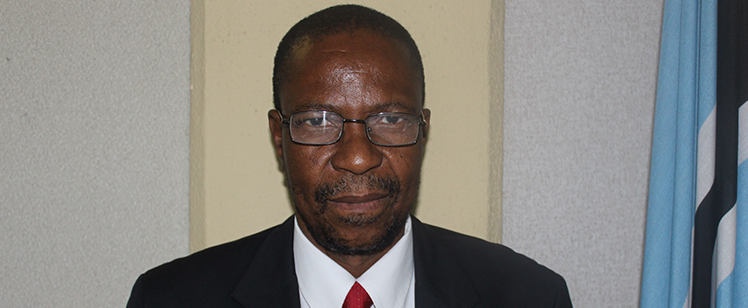-
Meet the new NFTRC Board Chairman…
Who is Dr John C Moreki?
Dr John C Moreki hails from Molepolole and is married with three children. He holds PhD in Animal Science, specialising in monogastric nutrition from University of the Free State in South Africa. He is currently working in the Ministry of Agricultural Development and Food Security (MoA) as the Deputy Permanent Secretary-Technical Services. Dr Moreki started working at MoA in 1985 until 2010 when he joined Botswana University of Agriculture and Natural Resources (BUAN) and later re-joined MoA in October 2016 on appointment as Deputy Permanent Secretary (Technical Services). Prior to joining the MoA Youth Expo Ministry he was a Senior Lecturer in the Department of Animal Science and Production at Botswana University Agriculture and Natural Resources (BUAN). Dr Moreki sits in NFRTC Board and Editorial Boards of various journals.
What is your general view about NFTRC?
NFTRC is well placed due to its mandate of research and development. In short it is the best thing that ever happened to MoA. It is the best thing because of the unique services that it offers, moreover its role of promoting the use of indigenous foods that were once shunned.
However Dr Moreki explained that he would like to see NFTRC achieving more, for example;
- Just like other MoA state-owned entities, NFTRC must be run as a business and make money to sustain itself.
- More collaboration must be nurtured such as partnering with key stakeholders such as Food and Agricultural and Organisation (FAO) to address challenges which include inter alia post-harvest losses, thus ensuring that the country is food secure.
- He believes that value addition is crucial in food value chains, and emphasized that production should not only end with the main product. He gave an example that NAPro could collaborate with BUAN to find ways of processing residual tomato peels and seeds as ingredients in animal feeds.
What are the key responsibilities that you intend to pursue as you join NFTRC?
- Ensuring that NFTRC blow their own trumpet, because too much research and innovation has been done. Moreover he would like to see NFTRC commercialising its technologies and sharing research outputs with stakeholders.
- Strengthening collaboration between NFTRC, MoA departments and other entities to complement the use of the available resources such as equipment, machineries and expertise.
- Taking an advantage of Economic Diversification Drive (EDD) and ensuring that government 20 April 2018 entities buy NAPro products.
- Facilitating sustainability of NAPro.
- Effective functioning of the Board.
The new (NFTRC) Strategic Plan 2018-2022 speaks of good culture as a driver for organisational excellence. What kind of culture would you like to see at NFTRC?
Dr Moreki said that the core values that are outlined in the new strategy are exactly what he perceives as good culture. He mentioned team work as the root of better and informed decisions and advised that staff members must not work in silos in accordance with the Setswana adage, ‘Moroto wa esi ga ga o ele.’
“The new Strategies always try to address challenges that occurred on the previous strategies, therefore a good culture will be the one that the new strategy brings, such as new ways of doing things, we can’t afford to be doing things the old way; change is invertible and to me good culture is when people are willing to embrace change,” said Dr Moreki.
“Mahatma Gandhi once quoted that, ‘You must be the change you want to see in the world.’ Therefore, change yourself first and see positivity in everything you do”, he added.
“Not forgetting the edge to always be on time – we must respond to our stakeholders promptly, giving them quality service that they deserve and always remembering that a corrupt free mind leads to excellence.” said Dr Moreki.
What motivates you in the area of Food Science and Technology?
“I am motivated by the need to value add by employing sound hygiene standards during processing which influence the quality of the final product. It is crucial that a wholesome product must be availed to the consumers; hence food safety is key in food production, he commented.
Do you think that the new NFTRC Strategy can be hindered by the impending merger?
We all know that NARDI has been on the cards for quite some time but as I am speaking to you we are working hard to get the merger on course. It is my wish that the current Strategic Plan is not derailed by the merger. However, we need to be alive to the fact that the final call on this Strategy will be made by the Board and Management of NARDI.
- mail@naftec.org
- Staff Webmail
- NFTRC Library
- Contact Us
